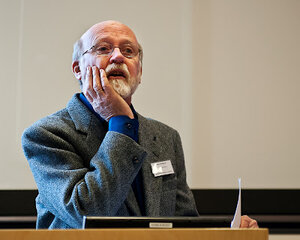Interview with Professor Peter Dahlgren

What is this course about?
The focus will be to analytically situate web use in political contexts, especially alternative democracy contexts. Context is important because there is a lot of discussion that seems to perceive these communication technologies as a techno fix for democracy’s ills, and thus it is important to understand their contingencies, that is the factors that enable and delimit them. For example, just because someone is doing something political online we cannot assume that participation is of the same character or intensity as it would be in face to face situations. How is it taught?
It will be combination of lectures and lots of discussion. Students will bring examples and case studies to enrich discussions. Topics for lectures may include the particular factors that shape the web environment, its technical architecture and political economy, and not least the risks and dangers involved, such as surveillance. What is unique about this course?
This is masterclass in media and political engagement, and the course derives from my work over the past few years. My two recent books consider political culture in regard to conceptualizing participation, understanding its grounds, linking this to larger horizons of the dilemmas facing democracy. As a student taking this course, your work in seminars and for your assignments will involve real world encounters of media in political contexts. Tell us about your latest book?
My new book is The Political Web: Media, Participation and Alternative Democracy (2013) and it takes up themes such as Occupy Wall Street, web journalism, online public intellectuals, civic subjectivity, and concludes with a discussion of what is critical media research. The book is about political participation in various forms. For example the focus for Occupy Wall Street is on the relationships between online and offline political participation.
The focus will be to analytically situate web use in political contexts, especially alternative democracy contexts. Context is important because there is a lot of discussion that seems to perceive these communication technologies as a techno fix for democracy’s ills, and thus it is important to understand their contingencies, that is the factors that enable and delimit them. For example, just because someone is doing something political online we cannot assume that participation is of the same character or intensity as it would be in face to face situations. How is it taught?
It will be combination of lectures and lots of discussion. Students will bring examples and case studies to enrich discussions. Topics for lectures may include the particular factors that shape the web environment, its technical architecture and political economy, and not least the risks and dangers involved, such as surveillance. What is unique about this course?
This is masterclass in media and political engagement, and the course derives from my work over the past few years. My two recent books consider political culture in regard to conceptualizing participation, understanding its grounds, linking this to larger horizons of the dilemmas facing democracy. As a student taking this course, your work in seminars and for your assignments will involve real world encounters of media in political contexts. Tell us about your latest book?
My new book is The Political Web: Media, Participation and Alternative Democracy (2013) and it takes up themes such as Occupy Wall Street, web journalism, online public intellectuals, civic subjectivity, and concludes with a discussion of what is critical media research. The book is about political participation in various forms. For example the focus for Occupy Wall Street is on the relationships between online and offline political participation.
